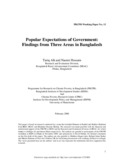| dc.description.abstract | This paper presents findings from research into expectations from the government, based on focus group discussion sessions with over 100 poor and very poor people in rural and urban Bangladesh. The research was designed to help improve our understanding of the political constraints shaping public policy with respect to poverty. The main research findings include that government was widely perceived as positive for the poor, and there was an unexpectedly clear understanding of the structure and operations of government, and of the mechanisms of political process and change. Findings of sources of information about government and politics highlight the continuing significance of community ‘brokers’, while also confirming the overpowering role of the public television in shaping perceptions of government. There seems to be considerable faith in the capacity of the poor to influence the government, and of the government to respond to the needs of the poor. Despite a generally positive appraisal of the role of government, the poor public is attuned to and critical of the actions of government which affect them directly. In their role as chief guarantors of the welfare of the poor, then the government fails when it fails to control the prices of essential goods. Respondents tended to find it difficult to prioritize between different issues and supported more governmental action in most areas. There was a reasonably clear sense of what made government legitimate, as well of the conditions under which different types of political protest are acceptable. The paper concludes that there is a high degree of awareness and involvement among the poor with respect to political matters. | en_US |

